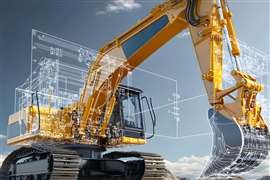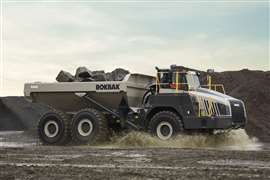Europlatform highlights enormous Turkish potential
04 October 2013

Turkey offers enormous potential for powered access although growth is being constrained by the heavy use of low-cost alternatives such as personnel baskets with knuckle boom cranes and scaffolding.
Other hot topics at the annual one-day Europlatform conference - organised by IPAF and Access International and attended by 120 delegates at the historic Pera Palace hotel in Istanbul - included the management of big booms and a call for better guidelines for working outside the basket.
The conference was told that Turkey’s buoyant economy and a large number of massive projects – including a third Istanbul airport and a new bridge over the Bosphorus river – meant that the demand for access equipment would rise significantly in the coming years.
Mustafa Bilgin, chairman of Istanbul Vinc, one of the largest crane and access rental companies in Turkey, said the fact that Europlatform was taking place in Istanbul was “an indication that the access industry is starting to take off in Turkey.”
He said there was growing demand for modern powered access but the common use of lower cost solutions such as crane baskets was hampering the introduction of booms and scissors. “There are tens of companies making such cranes in Turkey – it is very easy for rental companies to buy them.” Turkish import regulations also largely prevent the import of used machines, providing a barrier to entry for large rental companies in Europe.
Serkan Acar, general manager of Acarlar Makine, a major access equipment rental company and dealer in Turkey, told delegates that economic growth and major infrastructure projects would help boost the demand for powered access.
He said the current access rental fleet of around 2800 machines could increase annually by 20-25%, doubling by 2016, reaching more than 9000 units by 2018. Mr Acar added that new health and safety regulations would also help promote the use of powered access.
Speaking later in the panel discussion, Ms Merve Yerdelen Ellialtioglu, general manager of Tatmak & Karyer, a Turkish equipment dealer and JLG distributor, agreed that Turkey represented a growth opportunity but said expectations of a very rapid rental fleet expansion should be treated with some caution. She said her company had seen earlier ambitious projections for the industrial forklift market fail to fully materialise.
Other speakers at Europlatform included Pierre Boels of Boels Rental, Soren Rosenkrands of Riwal and Michael Rohmeder of Ritchie Bros.
Mr Boels revealed that he had visited Turkey five years ago and had planned to enter the market until growth opportunities elsewhere, including Italy, had led the company to postpone its move.
He said his company’s growth strategy was driven by international expansion and that these moves were not seen as short term; “It takes us 10 years before we can make a profit in a new country. So don’t be an opportunist. In our experience it takes a lot of time, and you have to be confident that your business model will be competitive in a new market.”
Soren Rosenkrands, chief operating officer of Riwal, highlighted the particular demands of managing large booms and emphasised a theme of shared responsibility between manufacturers, dealers and rental companies.
"Should we be scared [about large booms]? No, but a big boom and small boom are very different things and there is a shared responsibility between manufacturers and rental houses to make this sector safe."
He singled out the need for boom ropes on large machines to be replaced after seven years of operation. “A huge number of big booms were bought in Europe in the years [before the crisis] and they will need their boom ropes replaced…Is this happening? I hope so. It’s a big job. And what about machines sold outside of Europe? Who is responsible? I think we all are…we need to step up.”
Ritchie Bros key account manager, Mr Rohmeder, described the possible long term implications on asset values of used equipment on the use of Tier IV/Stage 3 engines, with developing regions of the world unable to source the high quality fuels or additives that these machines require.
He said it was unclear whether the engine manufacturers had ‘de-tiering’ solutions in place that would allow the export of the latest machines to these areas. “Will there be de-tiering kits, how much will they cost, and how complicated will they be?”
“I am not saying there will not be a solution, but today, I haven’t seen it. You as an industry need to ask the questions. We are facing a technological disruption – this will have an impact, but I don’t know what the impact will be. The ‘third life’ of equipment may even disappear completely if there is no de-tiering kit.”
Chris Wraith, technical officer at IPAF, raised the issue of operators leaving the basket at height and said there was a need for clear and concise guidance and an understanding of the ‘exceptional circumstances’ that would allow such practices.
“It happens, whether we like it or not, thousands of times a day all around the world….There is a place for it, as long as it is planned and managed.” Mr Wraith cited the case of workers on electricity pylons who can be transported to their work locations without arduous and potentially risky climbing. Mr Wraith said IPAF was working on creating fuller guidelines on the issue.
The final speaker of the day was Andy Studdert, chief executive officer of NES Rentals in the US, who described how new technology was helping his company improve its processes in areas including sales and pricing.
However, it was NES’s policy on home working that perhaps attracted most interest, with delegates requesting details of the company’s practice of allowing clerical and other office staff to work four, 10 hour days a week, two at home and two at the office. Mr Studdert said the policy has increased worker productivity by more than 35% and significantly reduced office costs.
Tim Whiteman, IPAF managing director, announced at the close of the conference that next year’s event would be held on 25 September in Berlin, Germany.




